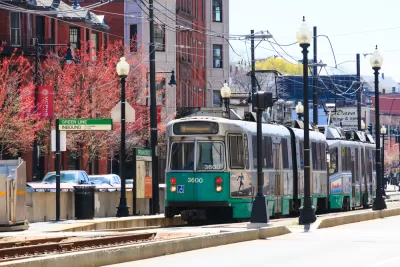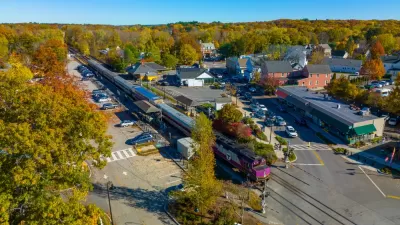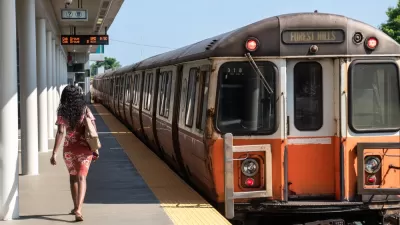Communities near transit stations will have to comply with a new set of regulations that support multifamily development and increased housing density.

Half of all Massachusetts towns will have to comply with a newly released set of rules governing multifamily zoning in areas near transit stations, reports Colin A. Young for the Lowell Sun.
Known as ‘MBTA communities,’ after the Massachusetts Bay Transportation Authority, 175 cities and towns are now required to meet certain conditions to continue receiving state funding from several major sources. “The multifamily housing districts must have a minimum gross density of 15 units per acre; be no more than half a mile from a commuter rail station, subway station, ferry terminal or bus station; have no age restrictions; and be suitable for families with children.”
In a letter, Secretary of the Executive Office of Housing and Economic Development (EOHED) Mike Kennealy and Undersecretary Jennifer Maddox wrote, “This law is not a housing production mandate. It is all about setting the table for more transit-oriented housing in the years and decades ahead — which is not just good housing policy, but good climate and transportation policy, too.”
The letter also detailed changes made to the law since the first draft. According to Young, “A minimum land area requirement was dropped, the unit capacity requirement was reduced for communities with a population less than 7,000 or fewer than 500 residents per square mile, ‘circuit breakers’ were installed to keep multifamily unit capacity from surpassing 25% of a community’s existing housing stock, and the rule about what portion of a multifamily zoning district must be within a half mile of a transit station was tailored to be more specific to each community.”
FULL STORY: State finalizes multifamily housing rules for MBTA communities

Planetizen Federal Action Tracker
A weekly monitor of how Trump’s orders and actions are impacting planners and planning in America.

Congressman Proposes Bill to Rename DC Metro “Trump Train”
The Make Autorail Great Again Act would withhold federal funding to the system until the Washington Metropolitan Area Transit Authority (WMATA), rebrands as the Washington Metropolitan Authority for Greater Access (WMAGA).

DARTSpace Platform Streamlines Dallas TOD Application Process
The Dallas transit agency hopes a shorter permitting timeline will boost transit-oriented development around rail stations.

Renters Now Outnumber Homeowners in Over 200 US Suburbs
High housing costs in city centers and the new-found flexibility offered by remote work are pushing more renters to suburban areas.

The Tiny, Adorable $7,000 Car Turning Japan Onto EVs
The single seat Mibot charges from a regular plug as quickly as an iPad, and is about half the price of an average EV.

Supreme Court Ruling in Pipeline Case Guts Federal Environmental Law
The decision limits the scope of a federal law that mandates extensive environmental impact reviews of energy, infrastructure, and transportation projects.
Urban Design for Planners 1: Software Tools
This six-course series explores essential urban design concepts using open source software and equips planners with the tools they need to participate fully in the urban design process.
Planning for Universal Design
Learn the tools for implementing Universal Design in planning regulations.
Municipality of Princeton
Roanoke Valley-Alleghany Regional Commission
City of Mt Shasta
City of Camden Redevelopment Agency
City of Astoria
Transportation Research & Education Center (TREC) at Portland State University
US High Speed Rail Association
City of Camden Redevelopment Agency
Municipality of Princeton (NJ)





























